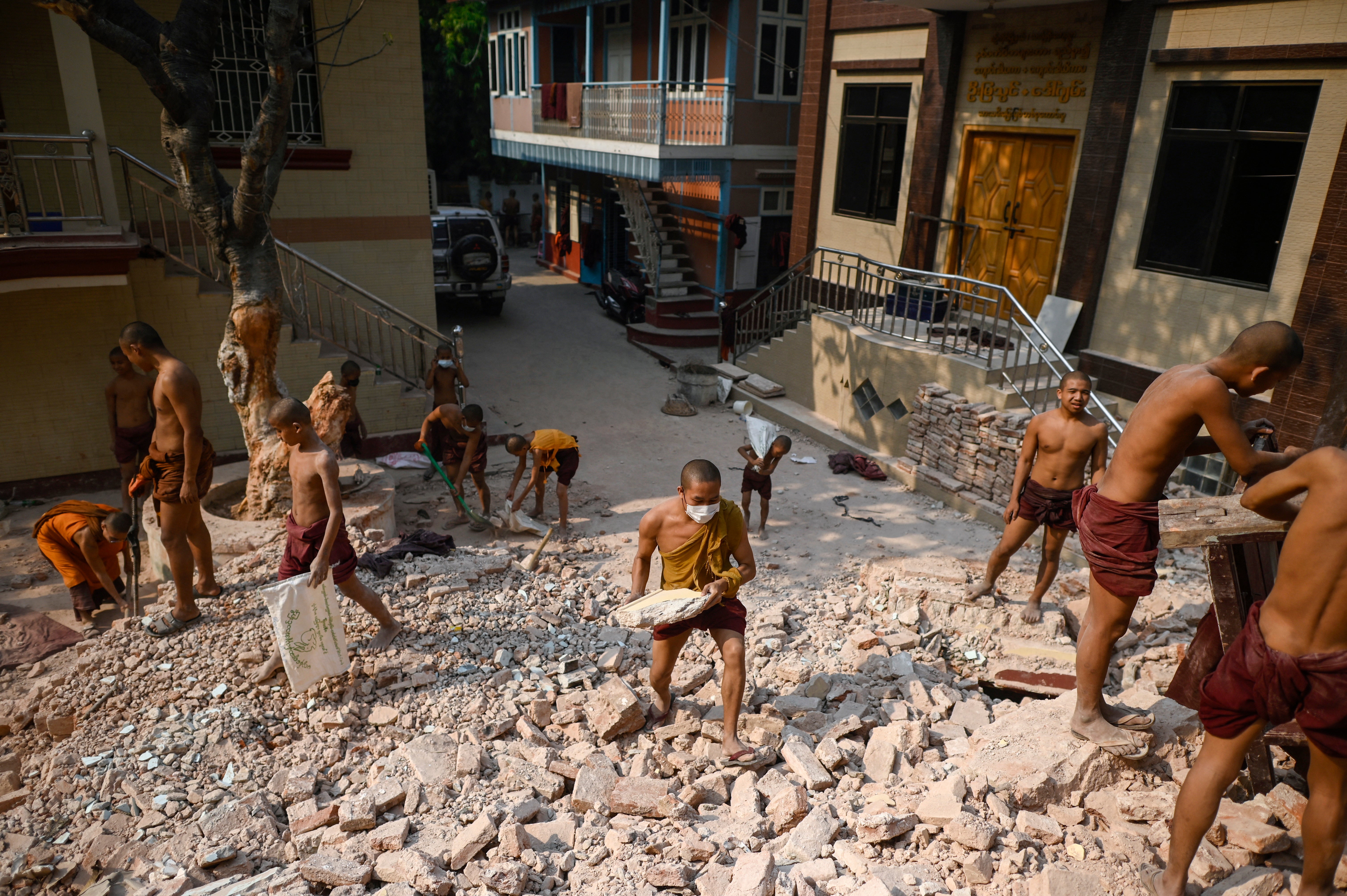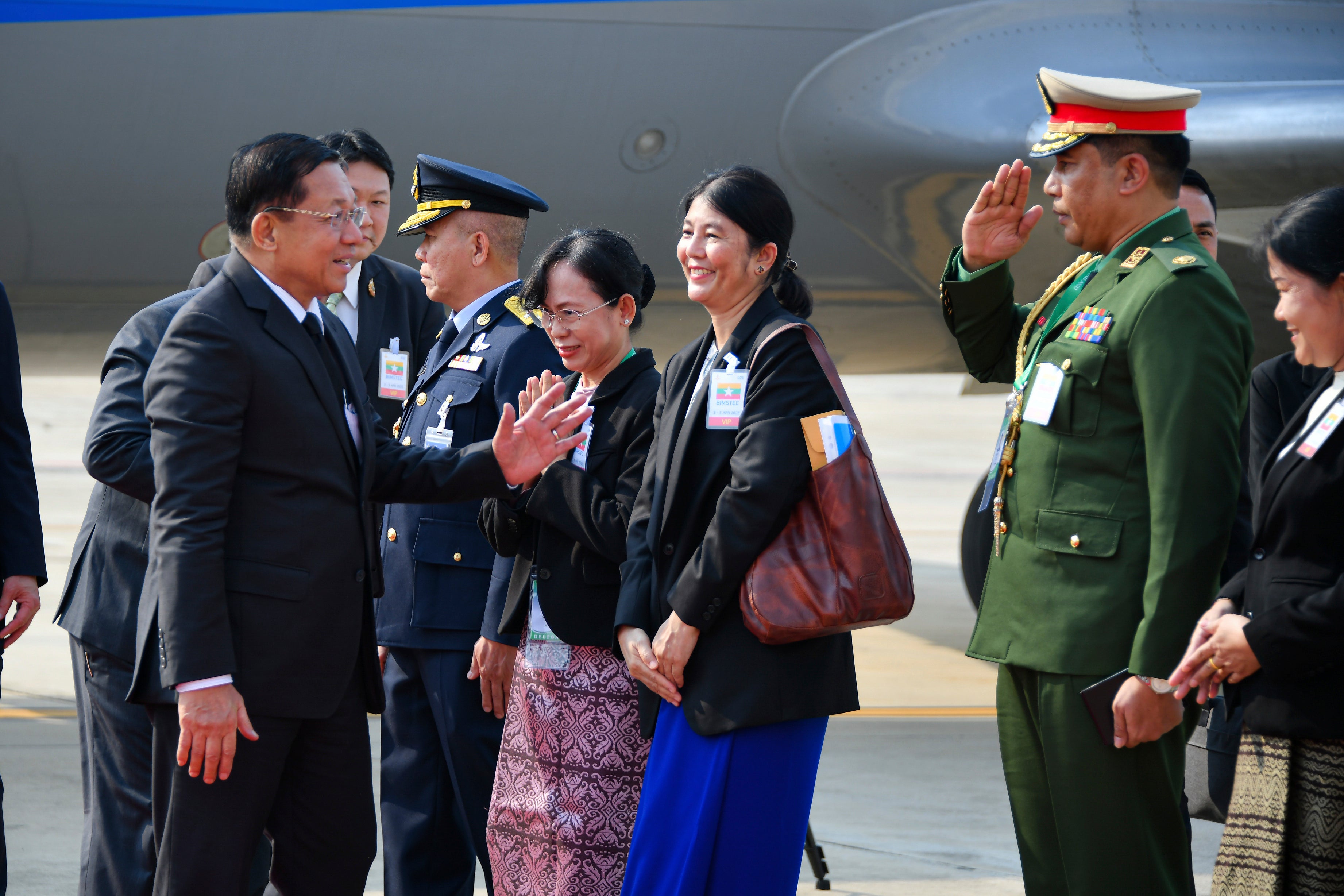
Myanmar’s military ruler shook hands with world leaders and delegates as he was hosted by Thailand for a regional summit despite protests by rights groups that he was overseeing a bloody civil war in his country even when it was reeling from the impact of a devastating earthquake.
Senior General Min Aung Hlaing’s military junta seized power after overthrowing the government of Aung San Suu Kyi in 2021. He had made a few trips outside Myanmar before, other than to Russia and China.
Shunned by much of the West and isolated with sanctions, Gen Hlaing arrived in Bangkok for a three-day summit of the Bay of Bengal nations that include India and Thailand.
Protesters raised banners declaring “We Do Not Welcome Murderer Min Aung Hlaing” near the hotel where the summit was taking place. His visit also drew condemnation from international rights forums and Myanmarese opposition groups.
The National Unity Government, NUG, established by elected lawmakers barred from taking their seats in the parliament by the junta, condemned Gen Hlaing’s presence at the summit claiming he did not have the legitimacy to represent Myanmar.
“Allowing the junta leader and his representatives to participate in regional and international forums risks legitimising an illegal regime,” the NUG said in a statement.

The Justice for Myanmar campaign group said it was “deplorable” that Thailand had invited him to a major summit. “This legitimises and emboldens a military junta that the people of Myanmar have been resisting for over four years,” Yadanar Maung, a spokesperson for the group, said in a statement.
His visit came as the UN human rights office accused the junta of limiting crucial humanitarian aid in many areas devastated by last week’s earthquake.
Ravina Shamdasani, spokesperson for the Office of the High Commissioner for Human Rights, said there was a catastrophic humanitarian situation in earthquake-hit areas, especially those outside the military's control.

The death toll from the 7.7-magnitude earthquake, one of the strongest to rock the country in a century, climbed to 3,145 on Friday, with more than 4,500 injured and nearly 200 still missing, the junta said.
Many areas were still waiting for rescue teams to reach, suggesting the death toll was unlikely to be accurate.
The general said he planned to discuss ways that other countries could help Myanmar with relief operations.
On the sidelines of the summit, the general held meetings with Thailand’s premier Paetongtarn Shinawatra and Indian prime minister Narendra Modi, with recovery from the quake a common topic.

Mr Modi called for the ongoing three-week post-earthquake ceasefire in the country of 55 million people to be made permanent, an Indian foreign ministry spokesman said.
"Political resolution to the conflict is the only way forward, starting with inclusive and credible elections," spokesman Randhir Jaiswal said in a post on X.
On Thursday, as Gen Hlaing landed in Bangkok, his military launched multiple airstrikes in Kachin and Karenni states and Sagaing region, breaching the temporary ceasefire with rebel fighters, according to the Kachin Independence Army rebel group.
The junta announced a ceasefire on Wednesday until 22 April with the condition that it would still undertake measures if rebel groups sought to damage communication lines, mobilise forces or take new territory.

The UN’s human rights office said there had been nearly 60 attacks after the earthquake, including 16 since the temporary ceasefire was announced on Wednesday.
"I urge a halt to all military operations and for the focus to be on assisting those impacted by the quake, as well as ensuring unhindered access to humanitarian organizations that are ready to support," High Commissioner for Human Rights Volker Turk said. "I hope this terrible tragedy can be a turning point for the country towards an inclusive political solution."
The military was under pressure to declare a ceasefire after its decision to launch airstrikes within hours of the earthquake hitting drew widespread condemnation. It was also accused of impeding the flow of aid to the affected areas.

“Min Aung Hlaing is grandstanding with Asian leaders in Bangkok following a devastating earthquake because he does not care about Myanmar’s people,” Elaine Pearson, Asia director for Human Rights Watch, said.
“What he cares about is garnering some legitimacy through high-level visits because ever since the February 2021 coup he has been rightly ostracised by most of the international community.”
The earthquake also caused destruction in Bangkok, the venue of the summit. At least 22 people died, 35 were injured and many trapped under a high-rise building that collapsed in the city.







